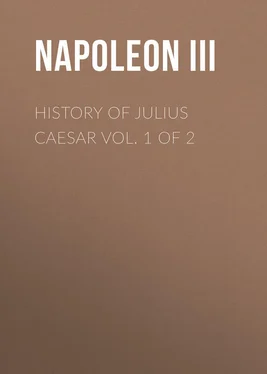Napoleon III - History of Julius Caesar Vol. 1 of 2
Здесь есть возможность читать онлайн «Napoleon III - History of Julius Caesar Vol. 1 of 2» — ознакомительный отрывок электронной книги совершенно бесплатно, а после прочтения отрывка купить полную версию. В некоторых случаях можно слушать аудио, скачать через торрент в формате fb2 и присутствует краткое содержание. Жанр: foreign_antique, foreign_prose, Биографии и Мемуары, на английском языке. Описание произведения, (предисловие) а так же отзывы посетителей доступны на портале библиотеки ЛибКат.
- Название:History of Julius Caesar Vol. 1 of 2
- Автор:
- Жанр:
- Год:неизвестен
- ISBN:нет данных
- Рейтинг книги:5 / 5. Голосов: 1
-
Избранное:Добавить в избранное
- Отзывы:
-
Ваша оценка:
- 100
- 1
- 2
- 3
- 4
- 5
History of Julius Caesar Vol. 1 of 2: краткое содержание, описание и аннотация
Предлагаем к чтению аннотацию, описание, краткое содержание или предисловие (зависит от того, что написал сам автор книги «History of Julius Caesar Vol. 1 of 2»). Если вы не нашли необходимую информацию о книге — напишите в комментариях, мы постараемся отыскать её.
History of Julius Caesar Vol. 1 of 2 — читать онлайн ознакомительный отрывок
Ниже представлен текст книги, разбитый по страницам. Система сохранения места последней прочитанной страницы, позволяет с удобством читать онлайн бесплатно книгу «History of Julius Caesar Vol. 1 of 2», без необходимости каждый раз заново искать на чём Вы остановились. Поставьте закладку, и сможете в любой момент перейти на страницу, на которой закончили чтение.
Интервал:
Закладка:
134
Titus Livius, III. 31. – Dionysius of Halicarnassus, X. 33 et seq.
135
“The plebeians complain loudly that their conquests have been taken from them; that it is disgraceful that, having conquered so many lands from the enemy, not the least portion of it remains to them; that the ager publicus is possessed by rich and influential men who take the revenue unjustly, without other title than their power and unexampled acts of violence. They demand finally that, sharing with the patricians all the dangers, they may also have their share in the advantages and profit derived from them.” (Year of Rome 298.) (Dionysius of Halicarnassus, X. 36.)
136
“The moment would have been well chosen, after having taken vengeance on the seditious, to propose, in order to soothe people’s minds, the partition of the territory of the Bolani; they would thus have weakened the desire for an agrarian law which would expel the patricians from the public estates they had unjustly usurped. For it was an indignity which cut the people to the heart, this rage of the nobility to retain the public lands they occupied by force, and, above all, their refusal to distribute to the people even the vacant lands recently taken from the enemy, which, indeed, would soon become, like the rest, the prey of some of the nobles,” (Year of Rome 341.) (Titus Livius, IV. 51.)
137
Titus Livius, V. 30.
138
Titus Livius, VI. 21. – It appears that the Pontine Marshes were then very fertile, since Pliny relates, after Licinius Mucianus, that they included upwards of twenty-four flourishing towns. ( Natural History , III. v. 56, edit. Sillig.)
139
Titus Livius, VI. 35-42. – Appian, Civil Wars , I. 8.
140
See the remarkable work of M. A. Mace, Sur les Lois Agraires , Paris, 1846.
141
Roman Colonies. – Second period: 244-416
Lavici (Labicum) (336). Latium. ( Via Lavicana .) La Colonna.
Vitellia (359). The Volscians. ( Via Prænestina .) Uncertain. Civitella or Valmontone .
Satricum (370). The Volscians. Banks of the Astura. Casale di Conca , between Anzo and Velletri .
Latin Colonies. – Second period: 244-416.
Antium (287). Volscians. Torre d’Anzio or Porto d’Anzio .
Suessa Pometia (287). Near the Pontine Marshes. Disappeared at an early period.
Cora . Volscians (287). Cori .
Signia (259). Volscians. Segni .
Velitræ (260). Volscians. Velletri .
Norba (262). Volscians. Near the modern village of Norma .
Ardea (312). Rutuli. Ardea .
Circeii (361). Aurunces. Monte Circello : San Felice or Porto di Paolo .
Satricum (369). Volscians. Casale di Conca .
Sutrium (371). Etruria. ( Via Cassia .) Sutri .
Setia (372) Volscians. Sezze .
Nepete (381). Etruria. Nepi .
142
It is thus that we see, in 416, each poor citizen receiving two jugera , taken from the land of the Latins and their allies. In 479, after the departure of Pyrrhus, the Senate caused lands to be distributed to those who had fought against the King of Epirus. In 531, the Flaminian law, which Polybius accuses wrongly of having introduced corruption into Rome, distributed by head the Roman territory situated between Rimini and the Picenum; in 554, after the capture of Carthage, the Senate made a distribution of land to the soldiers of Scipio. For each year of service in Spain or Africa, each soldier received two jugera , and the distribution was made by decemvirs. (Titus Livius, XXXI. 49.)
143
“Marcus Valerius demonstrated to them that prudence did not permit them to refuse a thing of small importance to citizens who, under the government of the kings, had distinguished themselves in so many battles for the defence of the Republic.” (Year of Rome 256.) (Dionysius of Halicarnassus, V. 65.) – “On one hand, the plebeians pretended not to be in a condition to pay their debts; they complained that, during so many years of war, their lands had produced nothing, that their cattle had perished, that their slaves had escaped or had been carried away in the different incursions of the enemies, and that all they possessed at Rome was expended for the cost of the war. On the other hand, the creditors said that the losses were common to everybody; that they had suffered no less than their debtors; that they could not consent to lose what they had lent in time of peace to some indigent citizens in addition to what the enemies had taken from them in time of war.” (Year of Rome 258.) (Dionysius of Halicarnassus, VI. 22.)
144
Those who pleaded the causes of individuals were nearly all senators, and exacted for this service very heavy sums under the title of fees. (Titus Livius, XXXIV. 4.)
145
“The days following, Servius Tullius caused a report to be drawn up of the insolvent debtors, of their creditors, and of the respective amount of their debts. When this was prepared, he caused counters to be established in the Forum, and, in public view, repaid the lenders whatever was due to them.” (Dionysius of Halicarnassus, IV. 10.)
146
“Servilius caused a herald to proclaim that all persons were forbidden to seize, sell, or retain in pledge the goods of Romans who served against the Volsci, or to take away their children, or any one of their family, for any contract whatever.” – “An old man complains that his creditor has reduced him to slavery: he declares loudly that he was born free, that he had served in all the campaigns as long as his age permitted, that he was in twenty-eight battles, where he had several times gained the prize of valour; but that, since the times had become bad, and the Republic was reduced to the last extremity, he had been constrained to borrow money to pay the taxes. After that, he added, having no longer wherewith to pay my debts, my merciless creditor has reduced me to slavery with my two children, and, because I expostulated slightly when he ordered me to do things which were too difficult, caused me to be disgracefully beaten with several blows.” (Year of Rome 259.) (Dionysius of Halicarnassus, VI. 29.) – “The creditors contributed to the insurrection of the populace, they cast aside all moderation, but threw their debtors into prison, and treated them like the slaves whom they would have bought for money.” (Year of Rome 254.) (Dionysius of Halicarnassus, V. 53.)
147
“The poor, especially those who were not in condition to pay their debts, who formed the greatest number, refused to take arms, and would hold no communication with the patricians, until the Senate should pass a law for the abolition of debts.” (Year of Rome 256.) (Dionysius of Halicarnassus, V. 63.)
148
Dionysius of Halicarnassus, V. 64.
149
Appius Claudius Sabinus expressed an opinion quite contrary to that of Marcus Valerius: he said that “there could be no doubt that the rich, who were not less citizens than the poor, and who held the first rank in the Republic, occupied the public offices, and had served in all the wars, would take it very ill if they discharged their debtors from the obligation of paying what was due.” (Year of Rome 256.) (Dionysius of Halicarnassus, V. 66.)
Читать дальшеИнтервал:
Закладка:
Похожие книги на «History of Julius Caesar Vol. 1 of 2»
Представляем Вашему вниманию похожие книги на «History of Julius Caesar Vol. 1 of 2» списком для выбора. Мы отобрали схожую по названию и смыслу литературу в надежде предоставить читателям больше вариантов отыскать новые, интересные, ещё непрочитанные произведения.
Обсуждение, отзывы о книге «History of Julius Caesar Vol. 1 of 2» и просто собственные мнения читателей. Оставьте ваши комментарии, напишите, что Вы думаете о произведении, его смысле или главных героях. Укажите что конкретно понравилось, а что нет, и почему Вы так считаете.












